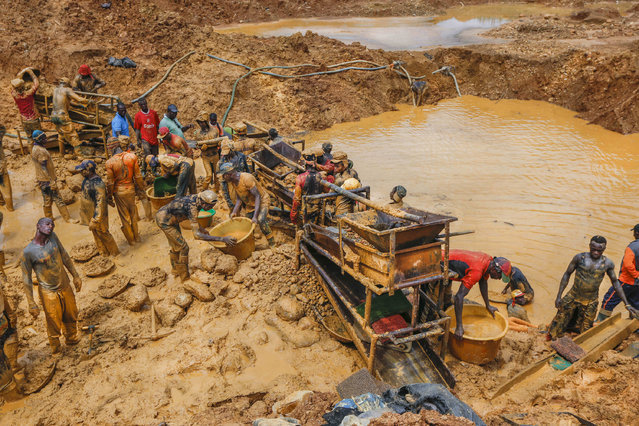
Weak enforcement promotes illegal mining— Discussants
Discussants at a plenary session of the National Consultative Dialogue on Small-Scale Mining have identified the lack of enforcement of laws against unregulated mining as one of the key factors responsible for illegal mining across the country.
They said influence in the work of institutions regulating the mining sector was another factor.
The discussants were a representative of the Media Coalition Against Galamsey, Nii Laryea Sowah; a representative of the Ministerial Committee to Develop a Blueprint for Small Scale Mining, Mr Benjamin Aryee; the acting Chief Executive Officer (CEO) of the Minerals Commission, Mr Martin Ayisi; the Finance Director of the Ghana National Association of Small-Scale Miners and the CEO of the Ghana Chamber of Commerce, Mr Suleman Koney.
Speakers
Setting the tone for the conversation, Mr Sowah said a poor licensing regime had resulted "in the mess that we find ourselves in".
In other jurisdictions, he said, the regulatory authorities ensured that they decentralised the licensing of small-scale miners in order to regulate their activities.
He called for a vigorous sensitisation to small-scale mining, adding that with the level of illiteracy and unemployment, the best solution was to sensitise the actors to understand the level of destruction they were causing the environment.
"We generally agreed that in terms of laws, polices and institutions, Ghana can rank very high globally. But the problem is: to what extent have we enforced the requirements of this?" he asked.
"Again, very importantly, sometimes it is the influence of very influential people in the work of institutions. So these are things we found to be significant to the impediments to the goals we set ourselves," he added.
Viable places
Mr Ayisi said getting viable places for small-scale mining was the issue.
The commission, he said, had designated over 4,000 square kilometres of land and that it was not just enough to say those were places for small-scale mining.
He said there were instances where small-scale miners were allocated places, but after sometime, they moved to the concessions of other people.
Mr Ayisi said getting small-scale miners viable places to work was what the country had not done.
Mr Opoku said the number one thing that small-scale miners looked for was getting viable and mineable places to mine.
Protocol
"Sometimes when the Minerals Commission manages to cede an area for mining, you realise that before it comes down to the small-scale miners, everything is gone through protocol," he said.
He said the laws regulating mining, to some extent, was good but the enforcement was the issue, stressing that those who were supposed to enforce the laws put their selfish interests ahead of the state.
Mr Koney also said persons who would not allow the law to work were a problem, and that it was unfortunate that "we have not been able to make an example of those people".
He said it was also necessary to build the capacity of small-scale miners, saying although the University of Mines and Technology had provided some training, that needed to be deepened.
"We need to ensure that we have people who are well trained and certified who can provide extension services to the small-scale miners. It is so critical," he said.
Environment key
A former Minister of Mines and Natural Resources, Mr Inusah Fuseini, who chaired the event, said although mining contributed to the development of the nation, it must not be done to the detriment of the environment.
He said unregulated small-scale mining destroyed the environment, polluted water bodies and posed health challenges to the people in areas they were done.
"Past governments have attempted to deal with small-scale mining, all with little successes," he said.
